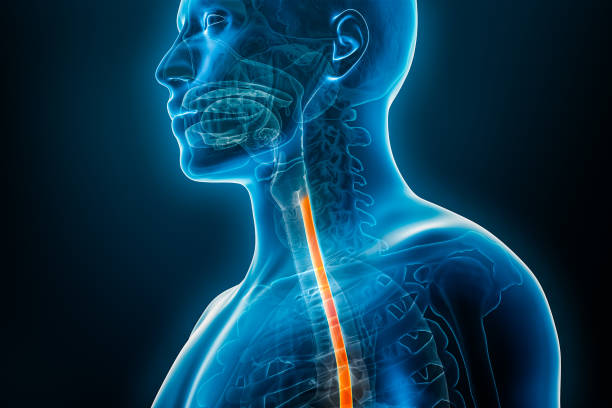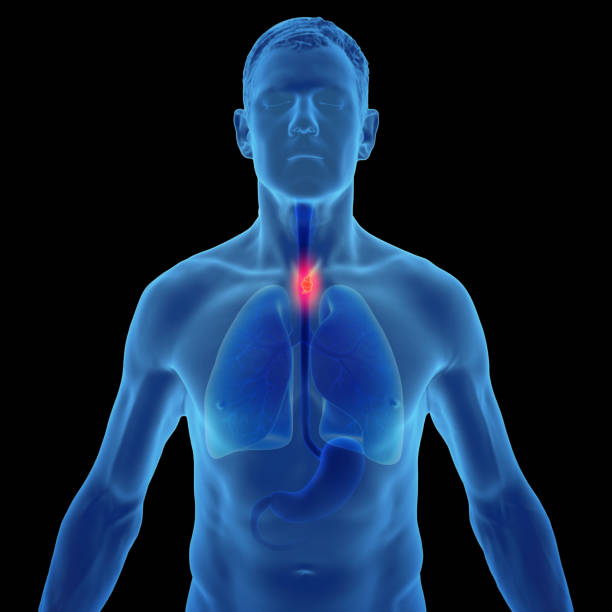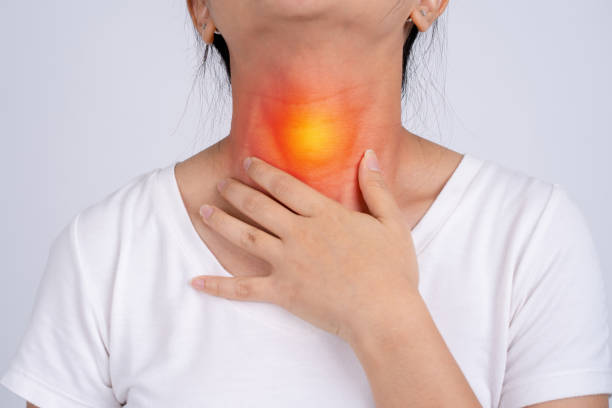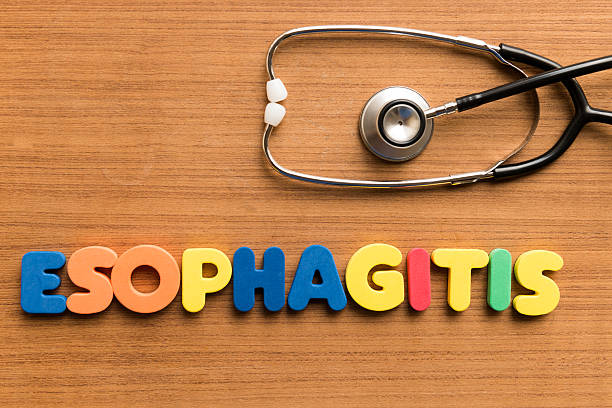Esophagitis refers to the inflammation or irritation of the esophagus, the tube that connects the throat to the stomach. This condition can range from mild discomfort to severe complications, affecting individuals of all ages. Esophagitis often arises from conditions that cause reflux of stomach acid into the esophagus, such as gastroesophageal reflux disease (GERD), but it can also result from infections, allergies, or reactions to medications. Understanding the causes, symptoms, diagnosis, and treatment options for esophagitis is crucial for effectively managing and alleviating this condition.
Table of Contents
Types of Esophagitis

Esophagitis can manifest in several distinct types, each characterized by different causes and mechanisms of inflammation:
- Reflux Esophagitis (GERD-related Esophagitis):
- This is the most common type and occurs when stomach acid backs up into the esophagus, leading to irritation and inflammation of the esophageal lining. Chronic GERD can cause erosive esophagitis, where the acid erodes the lining, leading to ulcers and strictures.
- Infectious Esophagitis:
- Caused by infections, usually fungal (such as Candida), viral (such as herpes simplex virus), or bacterial (rarely), which directly affect the esophageal tissues. Individuals with weakened immune systems are particularly susceptible to infectious esophagitis.
- Eosinophilic Esophagitis (EoE):
- An allergic inflammatory condition where eosinophils, a type of white blood cell associated with allergies, infiltrate the lining of the esophagus. EoE is often triggered by food allergies or environmental allergens and can lead to difficulties swallowing and food impaction.
- Drug-induced Esophagitis:
- Occurs when certain medications, such as non-steroidal anti-inflammatory drugs (NSAIDs), antibiotics, bisphosphonates (used to treat osteoporosis), or potassium chloride (taken as supplements), irritate the esophageal lining, leading to inflammation and sometimes ulceration.
- Radiation Esophagitis:
- Develops as a side effect of radiation therapy for cancers located near the esophagus. Radiation can damage the esophageal tissues, causing inflammation, ulcers, and strictures, which may affect swallowing and nutrition.
- Chemical Esophagitis:
- Caused by ingestion of corrosive substances, such as strong acids or alkalis, which directly damage the esophageal mucosa, leading to inflammation, ulceration, and potential scarring.
Each type of esophagitis requires specific diagnostic approaches and treatments tailored to its underlying cause. Understanding the type of esophagitis involved is crucial for guiding effective management strategies and preventing complications.
Symptoms of Esophagitis

Symptoms of esophagitis can vary depending on the type and severity of inflammation, but common signs and symptoms may include:
- Difficulty Swallowing (Dysphagia):
- Difficulty or pain when swallowing food or liquids, which can be mild to severe depending on the extent of esophageal inflammation or narrowing (strictures).
- Heartburn (Acid Reflux):
- A burning sensation in the chest, often occurring after meals or when lying down, due to stomach acid refluxing into the esophagus.
- Pain or Discomfort:
- Pain or discomfort in the chest, especially behind the breastbone (sternum), which may worsen when swallowing or bending over.
- Regurgitation:
- The sensation of food or liquid coming back up into the throat or mouth, often accompanied by a bitter or sour taste due to stomach acid reflux.
- Nausea and Vomiting:
- Feeling nauseous or experiencing vomiting, particularly if the inflammation is severe or accompanied by complications like strictures or ulcers.
- Difficulty in Eating:
- Avoidance of certain foods or textures due to discomfort or pain while swallowing, which can lead to unintentional weight loss or nutritional deficiencies.
- Chest Pain:
- Sharp or stabbing chest pain, which can mimic heart-related conditions. It may be worsened by swallowing or lying down and may improve with antacids or medications.
- Chronic Cough:
- Persistent coughing, especially at night or after meals, caused by acid irritating the throat or by small amounts of stomach contents reaching the lungs (aspiration).
- Voice Changes:
- Hoarseness or changes in voice quality, often due to irritation of the vocal cords caused by acid reflux.
- Bleeding:
- In severe cases, esophagitis can lead to bleeding or blood in vomit or stool, which requires immediate medical attention.
The presence and severity of these symptoms can vary from person to person and depend on the underlying cause and duration of esophageal inflammation. If you experience persistent or severe symptoms suggestive of esophagitis, it’s essential to seek medical evaluation for proper diagnosis and treatment.
Causes of Esophagitis

Esophagitis can have various causes, depending on the type of esophagitis. Here are some common causes associated with different types:
- Reflux Esophagitis (GERD-related):
- GERD (Gastroesophageal Reflux Disease): The primary cause is the reflux of stomach acid, bile, and digestive enzymes into the esophagus due to a weakened lower esophageal sphincter (LES) or abnormal relaxation of the LES. Factors contributing to GERD include obesity, pregnancy, hiatal hernia, and certain foods or medications.
- Infectious Esophagitis:
- Fungal Infections: Candida albicans, a type of yeast, is the most common cause of fungal esophagitis, especially in individuals with weakened immune systems (such as those with HIV/AIDS or undergoing chemotherapy).
- Viral Infections: Herpes simplex virus (HSV) or cytomegalovirus (CMV) can infect the esophagus, particularly in immunocompromised individuals.
- Bacterial Infections: Rarely, bacterial infections such as tuberculosis or syphilis can cause esophagitis.
- Eosinophilic Esophagitis (EoE):
- Allergic Reactions: EoE is believed to be triggered by allergic reactions to certain foods, environmental allergens, or airborne allergens. It involves an immune response that causes inflammation and accumulation of eosinophils in the esophageal tissues.
- Drug-induced Esophagitis:
- Medications: Certain medications, particularly those that can irritate or injure the esophageal lining, may cause drug-induced esophagitis. Examples include non-steroidal anti-inflammatory drugs (NSAIDs), bisphosphonates (used for osteoporosis), potassium chloride (taken as supplements), and certain antibiotics.
- Radiation Esophagitis:
- Radiation Therapy: Individuals undergoing radiation therapy for cancers in the chest or upper abdomen may develop radiation esophagitis. Radiation damages the healthy cells lining the esophagus, leading to inflammation, ulcers, and strictures.
- Chemical Esophagitis:
- Corrosive Ingestion: Ingestion of strong acids (e.g., battery acid) or alkalis (e.g., household cleaners) can directly damage the esophageal mucosa, causing chemical esophagitis.
- Other Causes:
- Autoimmune Disorders: Rarely, autoimmune diseases such as Crohn’s disease or systemic sclerosis (scleroderma) can cause inflammation and damage to the esophageal tissues.
- Physical Irritation: Prolonged use of nasogastric tubes or gastrostomy tubes (feeding tubes) can irritate the esophagus and lead to esophagitis.
Understanding the specific cause of esophagitis is crucial for determining the most appropriate treatment and management strategies. Depending on the underlying cause, treatment may involve medications to reduce acid reflux, antifungal or antiviral agents, dietary modifications, or other interventions aimed at alleviating symptoms and promoting healing of the esophageal lining.
Risk Factors
Several risk factors can predispose individuals to developing esophagitis, depending on the type and underlying causes. Here are some common risk factors associated with different types of esophagitis:
- Reflux Esophagitis (GERD-related):
- Hiatal Hernia: A condition where part of the stomach protrudes into the chest cavity through the diaphragm, weakening the lower esophageal sphincter (LES) and increasing the risk of reflux.
- Obesity: Excess weight can increase abdominal pressure, leading to more frequent episodes of acid reflux into the esophagus.
- Pregnancy: Hormonal changes and increased abdominal pressure during pregnancy can promote reflux of stomach contents into the esophagus.
- Infectious Esophagitis:
- Weakened Immune System: Conditions such as HIV/AIDS, organ transplantation, chemotherapy, or long-term steroid use can weaken the immune system, making individuals more susceptible to infections like Candida or viral esophagitis.
- Use of Antibiotics or Immunosuppressants: Medications that suppress the immune system or alter the normal balance of microorganisms in the body can increase the risk of fungal or bacterial infections in the esophagus.
- Eosinophilic Esophagitis (EoE):
- Allergies: Individuals with a history of allergies, asthma, or atopic conditions are at higher risk of developing EoE, as the condition is often triggered by allergic reactions to food or environmental allergens.
- Family History: EoE can run in families, suggesting a genetic predisposition to developing the condition.
- Drug-induced Esophagitis:
- Medication Use: Certain medications, particularly those that can irritate or injure the esophageal lining, increase the risk of drug-induced esophagitis. This includes NSAIDs (like ibuprofen), bisphosphonates (used for osteoporosis), and specific antibiotics.
- Radiation Esophagitis:
- Cancer Treatment: Individuals undergoing radiation therapy for cancers in the chest or upper abdomen are at risk of developing radiation esophagitis due to the direct damage radiation causes to healthy esophageal tissues.
- Chemical Esophagitis:
- Corrosive Substance Ingestion: Accidental ingestion of strong acids or alkalis, such as household cleaners or industrial chemicals, can cause severe chemical esophagitis.
- Age and Gender:
- Age: Esophagitis can occur at any age, but certain types (like EoE) may present more commonly in children and young adults, while reflux-related esophagitis tends to affect older adults.
- Gender: Some types of esophagitis, such as reflux esophagitis, are more common in males than females.
Understanding these risk factors is essential for identifying individuals who may be at higher risk of developing esophagitis and implementing preventive measures or early intervention strategies. For those with underlying conditions or risk factors, regular medical evaluation and appropriate management can help minimize the impact of esophagitis and reduce the risk of complications.
Diagnosis

Diagnosing esophagitis involves a combination of clinical evaluation, imaging studies, endoscopic procedures, and sometimes laboratory tests, depending on the suspected cause. Here’s an overview of the diagnostic methods commonly used:
- Medical History and Physical Examination:
- Your healthcare provider will start by taking a detailed medical history, including symptoms, duration, and any factors that may contribute to esophagitis (such as medication use, dietary habits, or medical conditions).
- A physical examination may help identify signs such as chest discomfort, abdominal tenderness, or signs of dehydration in severe cases.
- Upper Endoscopy (Esophagogastroduodenoscopy, EGD):
- EGD is the gold standard for diagnosing esophagitis. During this procedure, a thin, flexible tube with a camera (endoscope) is passed through the mouth and into the esophagus, stomach, and duodenum.
- The endoscope allows direct visualization of the esophageal lining to assess for signs of inflammation, erosions, ulcers, or other abnormalities.
- Biopsy samples may be taken during EGD to confirm the diagnosis and rule out conditions such as eosinophilic esophagitis or infections.
- Barium Swallow X-ray (Upper GI Series):
- This imaging test involves swallowing a contrast material (barium) that coats the esophagus, stomach, and upper small intestine.
- X-rays are then taken to visualize the structure and function of the esophagus, identifying any narrowing (strictures), ulcers, or abnormalities suggestive of esophagitis.
- Esophageal pH Monitoring:
- pH monitoring measures the level of acidity in the esophagus over a period of time, usually 24-48 hours.
- It helps assess the frequency and duration of acid reflux episodes, aiding in the diagnosis of reflux-related esophagitis (GERD).
- Laboratory Tests:
- Blood tests may be performed to evaluate for signs of infection (such as white blood cell count) or to assess for conditions that may predispose to esophagitis (like HIV/AIDS).
- Specific antibody tests or cultures may be ordered in suspected cases of infectious esophagitis.
- Manometry:
- Esophageal manometry measures the muscle contractions and coordination of the esophagus, helping to assess esophageal motility disorders that may contribute to esophagitis symptoms.
- pH Impedance Testing:
- This test measures both acid and non-acid reflux by monitoring changes in pH and impedance (resistance) along the length of the esophagus, providing a more comprehensive assessment of reflux episodes than standard pH monitoring.
The choice of diagnostic tests depends on the suspected type of esophagitis and the severity of symptoms. A thorough evaluation is crucial to accurately diagnose esophagitis, determine its underlying cause, and guide appropriate treatment strategies to alleviate symptoms and prevent complications.
Treatments for Esophagitis

Treatment for esophagitis depends on the underlying cause and severity of the condition. Here are common treatment approaches for different types of esophagitis:
1. Reflux Esophagitis (GERD-related):
- Lifestyle Modifications:
- Dietary Changes: Avoiding trigger foods (like spicy or acidic foods), eating smaller meals, and avoiding lying down after meals can help reduce reflux.
- Weight Management: Losing weight if overweight or obese can decrease pressure on the stomach and reduce reflux.
- Elevation of Head: Elevating the head of the bed or using pillows to elevate the upper body during sleep can help prevent acid reflux.
- Medications:
- Antacids: Over-the-counter antacids (like Tums or Maalox) neutralize stomach acid and provide temporary relief.
- H2 Blockers: Medications like ranitidine (Zantac) or famotidine (Pepcid) reduce acid production in the stomach.
- Proton Pump Inhibitors (PPIs): Stronger acid suppressors like omeprazole (Prilosec), esomeprazole (Nexium), or lansoprazole (Prevacid) are often prescribed to heal esophagitis and prevent further damage.
- Surgical Intervention:
- Fundoplication: In severe cases not responding to medications or lifestyle changes, surgery to tighten the LES may be considered to prevent reflux.
2. Infectious Esophagitis:
- Antifungal Therapy: For fungal infections (e.g., Candida), antifungal medications like fluconazole or clotrimazole are prescribed.
- Antiviral Therapy: Viral infections (e.g., herpes simplex virus or cytomegalovirus) may require antiviral medications such as acyclovir or ganciclovir.
- Antibiotics: Bacterial infections (e.g., tuberculosis) are treated with appropriate antibiotics.
3. Eosinophilic Esophagitis (EoE):
- Dietary Modifications: Elimination diets to identify and remove trigger foods (common allergens like dairy, wheat, or nuts) can reduce inflammation.
- Topical Steroids: Swallowed corticosteroids (e.g., fluticasone) can help reduce eosinophilic inflammation in the esophagus.
- Dilation: In cases of severe narrowing (strictures), endoscopic dilation may be required to widen the esophagus.
4. Drug-induced Esophagitis:
- Medication Adjustment: Avoiding or switching medications that irritate the esophagus (e.g., NSAIDs or certain antibiotics).
- Taking with Plenty of Water: Ensuring medications are taken with a full glass of water and remaining upright for at least 30 minutes afterward to prevent irritation.
5. Radiation Esophagitis:
- Supportive Care: Managing symptoms with pain relief medications and dietary adjustments (e.g., soft or liquid diet) to ease swallowing.
- Proton Pump Inhibitors: Prescribed to reduce acid production and protect the esophagus during radiation therapy.
6. Other Types of Esophagitis:
- Specific Treatments: Treatment will vary depending on the underlying cause, such as avoiding corrosive substances in chemical esophagitis or managing autoimmune diseases causing esophageal inflammation.
General Considerations:
- Follow-up: Regular follow-up with a healthcare provider to monitor symptoms, adjust medications if needed, and evaluate healing progress.
- Lifestyle Changes: Adopting healthy habits such as weight management, avoiding smoking, and reducing alcohol intake can support long-term management of esophagitis.
Treatment for esophagitis aims to alleviate symptoms, heal the esophageal lining, and prevent complications such as strictures or Barrett’s esophagus. It’s essential to work closely with a healthcare provider to tailor treatment based on the specific type and severity of esophagitis and individual health needs.
Prevention
Preventing esophagitis largely depends on its underlying cause. Here are some general strategies and preventive measures for common types of esophagitis:
1. Reflux Esophagitis (GERD-related):
- Lifestyle Modifications:
- Maintain a Healthy Weight: Obesity increases pressure on the stomach, promoting acid reflux. Managing weight through diet and exercise can reduce symptoms.
- Dietary Adjustments: Avoid trigger foods that can worsen reflux, such as spicy or acidic foods, caffeine, chocolate, and fatty foods.
- Meal Timing: Eat smaller meals and avoid lying down immediately after eating to reduce pressure on the LES (lower esophageal sphincter).
- Elevate the Head: Raise the head of your bed 6 to 8 inches by using bed risers or placing blocks under the bed’s legs to prevent nighttime reflux.
- Avoid Smoking and Alcohol: Both smoking and alcohol can weaken the LES and increase acid production, contributing to reflux.
- Medications: If prescribed medications like NSAIDs contribute to reflux symptoms, discuss alternatives or use them with a full glass of water and while remaining upright.
2. Infectious Esophagitis:
- Maintain Good Hygiene: Practicing good hand hygiene and avoiding exposure to individuals with contagious infections can reduce the risk of acquiring viral or bacterial esophagitis.
- Immunocompromised Precautions: Individuals with weakened immune systems should take precautions to avoid infections, including timely vaccination and appropriate management of underlying conditions.
3. Eosinophilic Esophagitis (EoE):
- Identify and Avoid Allergens: Undergo allergy testing to identify triggers (commonly foods) and follow an elimination diet to avoid allergens.
- Medical Management: Follow prescribed treatments such as swallowed corticosteroids or other medications to manage inflammation and prevent flare-ups.
4. Drug-induced Esophagitis:
- Take Medications Properly: Swallow medications with a full glass of water, remain upright for at least 30 minutes afterward, and avoid lying down immediately after taking medications known to irritate the esophagus.
- Discuss Alternatives: If medications consistently cause esophageal irritation, discuss alternative treatments or formulations with your healthcare provider.
5. Radiation Esophagitis:
- Radiation Planning: During radiation therapy, ensure that treatment planning focuses on minimizing exposure to the esophagus and protecting healthy tissue as much as possible.
- Symptom Management: Follow prescribed medications and dietary adjustments to manage symptoms such as pain and difficulty swallowing during radiation therapy.
6. Other Types of Esophagitis:
- Avoid Corrosive Substances: Take precautions to prevent accidental ingestion of strong acids or alkalis, such as storing household cleaners and chemicals safely out of reach.
- Manage Underlying Conditions: For autoimmune or systemic diseases contributing to esophagitis, work closely with healthcare providers to manage the condition and prevent complications.
General Tips:
- Regular Medical Check-ups: Attend routine medical check-ups and screenings to monitor esophageal health and detect early signs of esophagitis or related conditions.
- Healthy Lifestyle Choices: Adopting a balanced diet, regular exercise, and stress management techniques can support overall digestive health and reduce the risk of esophageal inflammation.
By implementing these preventive measures and working closely with healthcare providers to manage underlying conditions, individuals can reduce the likelihood of developing esophagitis and improve their overall esophageal health. Tailoring prevention strategies to specific risk factors and health conditions can further enhance their effectiveness in maintaining esophageal well-being.
Complications
Esophagitis can lead to several potential complications depending on its type, severity, and duration. Common complications include:
- Esophageal Strictures:
- Chronic inflammation and scarring of the esophageal lining can lead to narrowing of the esophagus (strictures). Strictures can cause difficulty swallowing (dysphagia) and may require endoscopic dilation to widen the esophagus.
- Barrett’s Esophagus:
- Long-term untreated reflux esophagitis can lead to changes in the lining of the esophagus called Barrett’s esophagus. Barrett’s esophagus increases the risk of developing esophageal adenocarcinoma, a type of cancer.
- Esophageal Ulcers:
- Severe inflammation may lead to the development of ulcers in the esophageal lining. These ulcers can cause pain, bleeding, and further complications if not treated promptly.
- Esophageal Bleeding:
- Ulcers or severe inflammation can lead to bleeding in the esophagus, which may present as blood in vomit (hematemesis) or black, tarry stools (melena).
- Aspiration Pneumonia:
- Reflux of stomach contents into the esophagus and subsequently into the lungs (aspiration) can lead to pneumonia, particularly in individuals with impaired swallowing reflexes or compromised immune systems.
- Malnutrition and Weight Loss:
- Difficulty swallowing (dysphagia) or avoidance of certain foods due to pain can lead to inadequate nutrition and unintended weight loss over time.
- Respiratory Issues:
- Chronic inflammation and reflux can lead to chronic cough, hoarseness, asthma exacerbations, and other respiratory symptoms.
- Eosinophilic Esophagitis (EoE) Complications:
- In severe cases, EoE can cause esophageal strictures and narrowing, leading to recurrent food impactions (food getting stuck in the esophagus), which require urgent medical intervention.
- Infectious Complications:
- Untreated infectious esophagitis, especially in immunocompromised individuals, can lead to systemic infections and potentially life-threatening complications.
- Psychosocial Impact:
- Chronic symptoms of esophagitis, such as pain, difficulty swallowing, and dietary restrictions, can significantly impact quality of life and psychological well-being.
Managing esophagitis promptly and effectively, addressing underlying causes, and following recommended treatments can help reduce the risk of complications. Regular medical follow-up and adherence to treatment plans are crucial for monitoring symptoms, healing the esophageal lining, and preventing long-term complications such as Barrett’s esophagus or esophageal cancer.
Living With Esophagitis
Living with esophagitis involves adopting strategies to manage symptoms, prevent flare-ups, and improve quality of life. Here are some practical tips for managing esophagitis:
- Dietary Modifications:
- Avoid Trigger Foods: Identify and avoid foods that trigger symptoms, such as spicy, acidic, fatty, or fried foods, caffeine, chocolate, and alcohol.
- Eat Smaller, Frequent Meals: Instead of large meals, eat smaller portions throughout the day to reduce pressure on the stomach and lower esophageal sphincter (LES).
- Chew Thoroughly: Chew food slowly and thoroughly to aid digestion and reduce the likelihood of reflux.
- Lifestyle Changes:
- Maintain a Healthy Weight: Obesity can worsen reflux symptoms. Maintain a healthy weight through diet and exercise to reduce pressure on the stomach.
- Elevate Head During Sleep: Raise the head of your bed 6 to 8 inches by using bed risers or placing blocks under the bed’s legs to prevent nighttime reflux. Alternatively, use a wedge pillow to elevate your upper body while sleeping.
- Quit Smoking: Smoking weakens the LES and increases acid production. Quitting smoking can improve symptoms and overall health.
- Medication Adherence:
- Take Prescribed Medications: If prescribed proton pump inhibitors (PPIs), H2 blockers, or other medications, take them as directed to reduce acid production and heal the esophageal lining.
- Stress Management:
- Practice Relaxation Techniques: Stress can exacerbate reflux symptoms. Practice relaxation techniques such as deep breathing, meditation, or yoga to manage stress levels.
- Hydration and Eating Habits:
- Stay Hydrated: Drink plenty of water throughout the day to help dilute stomach acid and aid digestion.
- Avoid Eating Late at Night: Eating close to bedtime can worsen reflux symptoms. Finish meals at least 2-3 hours before lying down.
- Medical Follow-up:
- Regular Check-ups: Attend regular follow-up appointments with your healthcare provider to monitor symptoms, adjust medications if needed, and evaluate healing progress.
- Avoiding Irritants:
- Avoid Irritants: Be cautious with medications known to irritate the esophagus, such as NSAIDs. If prescribed, take them with a full glass of water and remain upright afterward.
- Supportive Therapies:
- Dietitian Consultation: Consider consulting with a registered dietitian to develop a personalized diet plan that minimizes symptoms while ensuring adequate nutrition.
- Speech Therapy: If swallowing difficulties (dysphagia) are present, speech therapy may help improve swallowing techniques and reduce the risk of food impaction.
- Educate Yourself:
- Learn About Esophagitis: Understand your condition, its triggers, and how to manage symptoms effectively. Educating yourself empowers you to make informed decisions about your health.
- Support Network:
- Seek Support: Join support groups or seek support from friends and family who can provide encouragement and understanding during your journey with esophagitis.
Living with esophagitis involves a multifaceted approach that combines lifestyle modifications, medication adherence, and regular medical follow-up. By implementing these strategies, individuals can better manage symptoms, reduce the frequency of flare-ups, and improve their overall quality of life.
Conclusion
Esophagitis is a condition that can significantly impact daily life, but with proper management and lifestyle adjustments, many individuals can effectively control symptoms and prevent complications. Whether caused by reflux, infections, allergies, or other factors, the key to living well with esophagitis lies in understanding the triggers and adopting strategies to minimize their impact.
From dietary modifications and medication adherence to stress management and regular medical follow-up, each aspect of treatment plays a crucial role in managing symptoms and promoting esophageal health. Avoiding trigger foods, maintaining a healthy weight, elevating the head during sleep, and staying hydrated are practical steps that can help alleviate discomfort and reduce reflux episodes. Additionally, quitting smoking and managing stress levels can contribute to overall improvement in symptoms.
For those with chronic or severe esophagitis, ongoing support from healthcare providers, including gastroenterologists and dietitians, is essential. They can offer personalized treatment plans and monitor progress to ensure effective symptom management and reduce the risk of complications such as strictures or Barrett’s esophagus.
By embracing a proactive approach to managing esophagitis and making lifestyle choices that support esophageal health, individuals can enhance their quality of life and enjoy greater comfort in their daily activities. With continued diligence and support, living with esophagitis can be effectively managed, allowing individuals to focus on enjoying life to the fullest.
